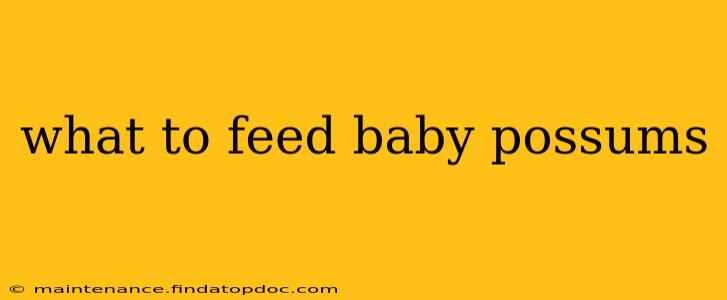Finding a baby possum can be a distressing experience, but knowing how to care for it properly is crucial for its survival. Feeding a baby possum requires careful attention to detail, as their dietary needs differ significantly from adult possums. This guide will answer your questions and provide you with the knowledge to ensure the little marsupial thrives. Remember, it is illegal in many places to keep wildlife without the proper permits. Contact your local wildlife rehabilitation center immediately if you find a baby possum. They have the expertise and resources to provide the best possible care.
What do baby possums eat?
Baby possums, also known as joeys, primarily feed on their mother's milk during their early stages of life. Once weaned, their diet transitions to a mix of foods mirroring their natural environment. The key is to mimic this diet as closely as possible if you're temporarily caring for one.
What kind of formula should I use for a baby possum?
Do not attempt to make your own formula. Using an incorrect formula can be fatal for a baby possum. Instead, contact your local wildlife rehabilitator immediately. They will have access to the appropriate formula specifically designed for marsupials. This formula contains the essential nutrients and electrolytes necessary for their development.
What foods can I feed a weaned baby possum?
Once a joey is weaned and ready for solid foods (this is determined by a wildlife rehabilitator), the diet should include:
- Insects: Mealworms, crickets, and other insects are excellent sources of protein. Ensure they're gut-loaded (fed nutritious food) before offering them to the possum.
- Fruits: Small pieces of soft fruits like berries, bananas (mashed), and melon are good sources of carbohydrates and vitamins. Avoid citrus fruits.
- Vegetables: Finely chopped vegetables like sweet potato, carrots, and green beans offer valuable nutrients. Steam them to soften them.
- Meat: Small pieces of cooked, lean meat such as chicken or turkey can be offered sparingly.
Important Considerations:
- Size: Food should be appropriately sized for the possum's small mouth and digestive system. Always cut food into tiny pieces to prevent choking hazards.
- Variety: Providing a varied diet ensures the possum receives a wide range of nutrients.
- Freshness: Always offer fresh, clean food and remove any uneaten portions to prevent spoilage.
- Hydration: Ensure access to fresh water at all times. A shallow dish or a small bottle cap might be appropriate.
What should I avoid feeding a baby possum?
Several foods are toxic or harmful to possums and should be avoided completely:
- Cow's milk: Cow's milk is not suitable for baby possums and can cause digestive upset.
- Chocolate: Chocolate contains compounds that are toxic to possums.
- Avocado: Avocados contain persin, which is toxic to many animals, including possums.
- Onions and garlic: These contain compounds that can damage a possum’s red blood cells.
- Processed foods: Avoid any processed foods, junk food, or sugary treats.
What if I find a baby possum?
If you encounter a baby possum, do not attempt to raise it yourself. The best course of action is to contact your local wildlife rehabilitation center or animal control immediately. They are equipped to provide the necessary care and expertise to ensure the possum's survival. Improper care can lead to illness, malnutrition, and even death.
Remember, wildlife rehabilitation is best left to the professionals. Your prompt action and responsible decision to contact the relevant authorities are crucial for the baby possum's well-being.
